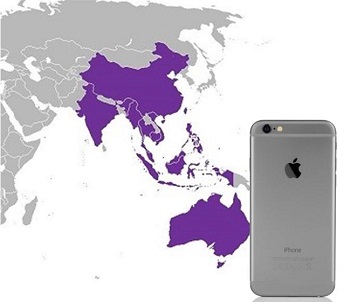Apple Pay will expand in early 2016, giving more consumers access to mobile payments
Apple Pay is set to expand to prominent markets in Asia. The mobile payments service has managed to find modest success in the United States, but it has yet to become a mainstream service that consumers favor over other alternatives. Apple believes that the service will find significant success in Asian markets due to the growing number of people relying on their mobile devices to shop for and purchase the products that they are interested in.
Apple Pay to come to China, Hong Kong, and Singapore
Apple is preparing to launch its new mobile payments service in China, Hong Kong, and Singapore next year. The company is also expected to bring Apple Pay to Spain at some point in 2016, tapping into the growing mobile payments market in Europe. Notably, China and Hong Kong may be where Apple Pay finds the most success, but also the most competition. Mobile payments have been popular in Hong Kong for several years, with many companies having already established a major foothold that will make it difficult for Apple to find any traction. This is also true in China, where massive companies like Alibaba and Tencent have become involved in the mobile payments space.
Competition is strong in the Asian mobile payments space
 While Apple Pay will be coming to new markets, Apple has been experiencing some pushback from financial institutions in several markets. Banks, in particular, are unsure of the value of Apple Pay, largely due to the other payment services that exist. Some of these banks have their own mobile payments platforms and see Apple Pay as something that will have only moderate appeal to consumers.
While Apple Pay will be coming to new markets, Apple has been experiencing some pushback from financial institutions in several markets. Banks, in particular, are unsure of the value of Apple Pay, largely due to the other payment services that exist. Some of these banks have their own mobile payments platforms and see Apple Pay as something that will have only moderate appeal to consumers.
More retailers are beginning to support mobile payments
China is currently the leading mobile payments market, with many companies offering some degree of mobile commerce support. As smartphone penetration increases in the country, more consumers are beginning to rely on their devices to shop for products online. As a result, retailers are beginning to show more favor for mobile payments services, which allow them to better connect with consumers.
PayPal survey shows that retailers are beginning to focus more heavily on young consumers
Retailers are likely to focus more on young consumers in the coming years as mobile commerce becomes more prevalent. A recent survey from PayPal found that some 59% of smartphone shoppers are between the ages of 18 and 34. These consumers are also more likely to conduct their mobile shopping through an application rather than a mobile website. Apps are seen as more convenient by many consumers and they offer a better shopping experience.
Consumers have strong interested in NFC technology
The survey from PayPal found that 47% of consumers prefer to shop through apps rather than mobile browsers. Notably, those preferring to shop with their smartphones noted that the feature they are most interested in seeing in the future is the ability to tap a phone to a payment terminal to make a purchase. This may be good news for companies that are investing in NFC technology, which is used in the mobile commerce space to transmit digital information over short distances.
China is leading the way when it comes to mobile shopping
 PayPal’s survey found that China is home to the largest mobile shopping population. Approximately 68% of Chinese consumers shop online, either from a mobile device or a computer. The United Arab Emirates and Turkey follow behind China, with healthy online shopping activity. The most commonly purchased product purchased by China’s mobile shoppers were leisure products. In the United States, consumers used their mobile devices to purchase food and drink more than any other product category.
PayPal’s survey found that China is home to the largest mobile shopping population. Approximately 68% of Chinese consumers shop online, either from a mobile device or a computer. The United Arab Emirates and Turkey follow behind China, with healthy online shopping activity. The most commonly purchased product purchased by China’s mobile shoppers were leisure products. In the United States, consumers used their mobile devices to purchase food and drink more than any other product category.
Retailers are beginning to focus more on apps rather than mobile websites
While consumers reported that mobile-friendly websites would encourage them to shop more frequently, they still prefer applications. Apps are often seen as more secure and capable of meeting the needs of consumers. Retailers have been working to improve their mobile websites, but a growing number of these companies have begun relying on apps in order to effectively engage consumers. Some retailers are also beginning to develop their own mobile commerce apps, hoping to secure a new generation of mobile shoppers.
 While Apple Pay will be coming to new markets, Apple has been experiencing some pushback from financial institutions in several markets. Banks, in particular, are unsure of the value of Apple Pay, largely due to the other payment services that exist. Some of these banks have their own mobile payments platforms and see Apple Pay as something that will have only moderate appeal to consumers.
While Apple Pay will be coming to new markets, Apple has been experiencing some pushback from financial institutions in several markets. Banks, in particular, are unsure of the value of Apple Pay, largely due to the other payment services that exist. Some of these banks have their own mobile payments platforms and see Apple Pay as something that will have only moderate appeal to consumers.
 PayPal’s survey found that China is home to the largest mobile shopping population. Approximately 68% of Chinese consumers shop online, either from a mobile device or a computer. The United Arab Emirates and Turkey follow behind China, with healthy online shopping activity. The most commonly purchased product purchased by China’s mobile shoppers were leisure products. In the United States, consumers used their
PayPal’s survey found that China is home to the largest mobile shopping population. Approximately 68% of Chinese consumers shop online, either from a mobile device or a computer. The United Arab Emirates and Turkey follow behind China, with healthy online shopping activity. The most commonly purchased product purchased by China’s mobile shoppers were leisure products. In the United States, consumers used their 